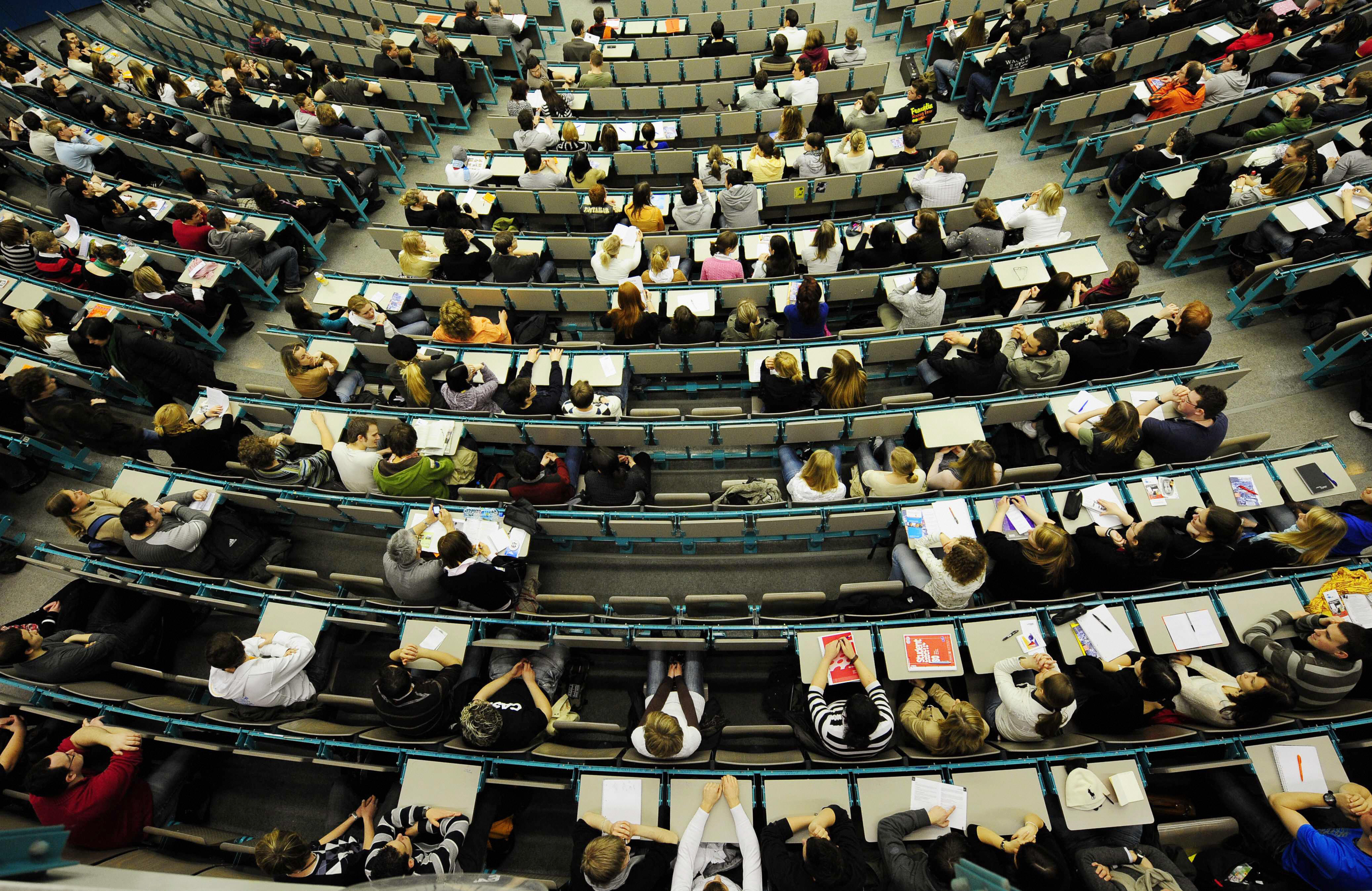The case for federal universities
If we want a massive expansion of free public college, let's just do it


America's higher education system is hopelessly broken. And everyone knows it.
Developments like the rise of exploitative and lousy for-profit colleges, the explosion in student debt, and the endless rise in tuition costs as states cut education subsidies — not to mention the assault on higher education in the Republican tax reform plan — have led many Americans, including last year's Democratic runner-up Bernie Sanders, to call for "tuition-free" college.
This is a worthy idea. But it would make a lot more sense coupled to another bold policy: a huge new network of free federal universities.
The Week
Escape your echo chamber. Get the facts behind the news, plus analysis from multiple perspectives.

Sign up for The Week's Free Newsletters
From our morning news briefing to a weekly Good News Newsletter, get the best of The Week delivered directly to your inbox.
From our morning news briefing to a weekly Good News Newsletter, get the best of The Week delivered directly to your inbox.
Imagine 10 new federal universities that each enrolled 50,000 students, split 40,000 to 10,000 between undergraduate and graduate students. These schools would be heavy on academic staff, employing something like 4,000 faculty to put federal campuses below the average student-faculty ratio. Salaries would be compressed, with adjunct and assistant professors being paid well, and only a bit less than tenured professors. (No brutal exploitation of academic labor here!) Faculty would also help run the school. But in return, full professors would get first bite at a generous pool of research dollars.
Meanwhile, these federal universities would be very light on administrative staff — say at a 1:1 ratio with faculty — with few amenities and straightforward buildings. No hideously expensive luxury gyms, no gigantic sports arenas, and no wasteful vanity-project buildings. They would buck the trend of treating students like consumers, where college is sold as something akin to living at a well-stocked country club. Instead, it would be all about excellent education, delivered as efficiently as possible. And instead of the consumer approach, the emphasis would be on social solidarity and mutual support — the country provides free college for you now, and in return, when you get a job, you pay into the system for people coming up behind you.
The problem with Sanders' higher education plan (like many similar liberal policies, such as Medicaid) is it tries to coax states into doing something many of them aren't going to want to do. Sanders' proposal would provide $46 billion, gained from a new financial transactions tax, as an inducement for states to pony up another $24 billion to make tuition free at public colleges and universities.
That $24 billion is well worth paying. For one, debt subsidies for higher ed have become a disaster: Outstanding student loan debt now tops $1.4 trillion, and one in four borrowers are either delinquent or defaulted. But many if not most states aren't going to want to cut tuition to zero. Indeed, because almost all states have balanced budget requirements, providing public goods in general is routinely a struggle, particularly in tough economic times. The main reason so many states cut back on higher ed was the recession, of course, but it was made much worse by this restriction on borrowing.
A free daily email with the biggest news stories of the day – and the best features from TheWeek.com
Tuition-free college would make this situation even worse, because there would almost certainly be a big expansion in enrollment from people tempted by the low price — thus increasing the required state funds.
America needs universal access to higher education. But let's be real: The ability and desire of states to provide it is going to be limited. There can be little doubt that many Republican-held state governments — think Wisconsin Gov. Scott Walker, who has all but declared war on his state's higher education system — would simply refuse to play ball with this liberal demand.
But a massive new network of high-quality federal universities — paid for and run by Uncle Sam — would sidestep this problem entirely.
The federal government is not only not debt-constrained, its borrowing capacity is hundreds of times greater than any state's could ever be. The federal government completely shouldering a big new university system would put this system on the soundest possible economic footing — while at the same time, it might conceivably ease some of the strain on state systems. (Then we might say any state that makes its colleges tuition-free will see the feds pick up 100 percent of the tab.)
As Lyman Stone details, there have been almost no new high-quality universities built since the 1980s, despite the fact that demand for higher education has increased tremendously since then. There have been a lot of for-profit schools springing up to fill the demand, but these are generally lousy if not outright predatory.
Big new federal universities would also have a handy economic development side benefit. If we aim for that initial capacity of 10 universities with 50,000 students each, we could then place them in 10 cities badly in need of an economic lift. Think Detroit, Baltimore, Memphis, New Orleans, Jackson, El Paso, and so on — and give each one a permanent anchor of population, jobs, and tax revenue. As Stone demonstrates in another article, even relatively small universities can reap a substantial economic benefit. The small town of Pikeville in remote Appalachia is bucking regional trends of decline due to the University of Pikeville there.
And it's not just the fact of having lots of mouths to feed at local restaurants and such. Universities make it far easier for locals to get educated, boost local professions, develop regional R&D, and help in hundreds of other ways. Studies demonstrate that universities throw off huge quantities of broad regional benefits — as well as national ones. A modern economy simply must have a high-quality secondary education and research system.
The liberal approach to problems like this is often to dream up some complicated incentive program to coax private actors into providing some public good (see: ObamaCare). This is why we have subsidized college loans, tax breaks for private colleges, and so on. The benefits of these schemes are, as often as not, partially captured by those actors — if not outright stolen.
A more direct approach is the better one. If we want to provide a good education to millions of future Americans, let's just do it. If you want something very big done very quickly, and there's no profit in it, you can't beat good old Big Government.
Ryan Cooper is a national correspondent at TheWeek.com. His work has appeared in the Washington Monthly, The New Republic, and the Washington Post.
-
 Does standing up to Trump help world leaders back at home?
Does standing up to Trump help world leaders back at home?Today’s Big Question Mark Carney’s approval ratings have ‘soared to new highs’ following his Davos speech but other world leaders may not benefit in the same way
-
 Will AI kill the smartphone?
Will AI kill the smartphone?In The Spotlight OpenAI and Meta want to unseat the ‘Lennon and McCartney’ of the gadget era
-
 Must-see bookshops around the UK
Must-see bookshops around the UKThe Week Recommends Lose yourself in beautiful surroundings, whiling away the hours looking for a good book
-
 The billionaires’ wealth tax: a catastrophe for California?
The billionaires’ wealth tax: a catastrophe for California?Talking Point Peter Thiel and Larry Page preparing to change state residency
-
 Bari Weiss’ ‘60 Minutes’ scandal is about more than one report
Bari Weiss’ ‘60 Minutes’ scandal is about more than one reportIN THE SPOTLIGHT By blocking an approved segment on a controversial prison holding US deportees in El Salvador, the editor-in-chief of CBS News has become the main story
-
 Has Zohran Mamdani shown the Democrats how to win again?
Has Zohran Mamdani shown the Democrats how to win again?Today’s Big Question New York City mayoral election touted as victory for left-wing populists but moderate centrist wins elsewhere present more complex path for Democratic Party
-
 Millions turn out for anti-Trump ‘No Kings’ rallies
Millions turn out for anti-Trump ‘No Kings’ ralliesSpeed Read An estimated 7 million people participated, 2 million more than at the first ‘No Kings’ protest in June
-
 Ghislaine Maxwell: angling for a Trump pardon
Ghislaine Maxwell: angling for a Trump pardonTalking Point Convicted sex trafficker's testimony could shed new light on president's links to Jeffrey Epstein
-
 The last words and final moments of 40 presidents
The last words and final moments of 40 presidentsThe Explainer Some are eloquent quotes worthy of the holders of the highest office in the nation, and others... aren't
-
 The JFK files: the truth at last?
The JFK files: the truth at last?In The Spotlight More than 64,000 previously classified documents relating the 1963 assassination of John F. Kennedy have been released by the Trump administration
-
 'Seriously, not literally': how should the world take Donald Trump?
'Seriously, not literally': how should the world take Donald Trump?Today's big question White House rhetoric and reality look likely to become increasingly blurred
